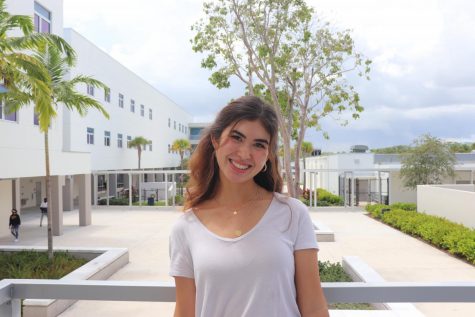Documenting Food Insecurity: How One Palmetto Teacher Used Film to Spread Awareness
May 3, 2021
South Florida may be known for its sunny weather and beautiful beaches, but in addition to white sands and blue skies, it is also the most food insecure region of the United States, according to the U.S. Census Bureau. Miami Palmetto Senior High School English teacher Alicia Edwards hopes to highlight this startling statistic and bring attention to the issue through her new documentary about food insecurity.
“I’d like for people to understand what’s happening within cities, not just in Miami in particular, but in America in general,” Edwards said. “I think it’s important to shine a light on that.”
The documentary is one of three filmed for “Pass the Mic: Tell Our Stories,” a compilation of short documentaries about various community issues exacerbated by the pandemic: evictions, food insecurity and incarcerations. The project, presented by Oolite Arts and the Community Justice Project, matched filmmakers with Miami residents impacted by these problems.
“My background is as a broadcast journalist, but I was invited by Oolite Arts Foundation to make this film. I’ve never covered food insecurity specifically before, but [Oolite] was familiar with my work [as a broadcast journalist] and a few other projects that I’ve worked on in Miami,” Edwards said.
As the director and producer, Edwards was responsible for hiring a camera crew, directing their shots and devising the angle of the story. She also worked closely with the editor, directing editing and sound production throughout the entire process.
However, Edwards acknowledged some differences in creating a documentary versus writing a news story.
“Journalism, in general, just needs a soundbite or two lines that support your topic. Filmmaking is very different because you have to go back to the people time and time again and they have to be willing to receive you. Film requires that you spend much more time with the participants, and you really have to create relationships with them in order to get the best story,” Edwards said. “So I think that relationship-building is a really important component.”
Edwards was paired with the Village FREE(DGE), an organization that combats food insecurity in Miami through easily-accessible community refrigerators. The community fridges help feed Miami residents struggling to purchase their own food or make it to food drives. Edwards highlighted the fridge located in Liberty City, as well as the founder of the Village FREE(DGE), Sherina Jones.
“Following Sherina… was my favorite because she’s just such a selfless person. She just really is so concerned about her community. That’s always at the forefront of her mind and it was really inspiring to watch that,” Edwards said.
Even though “Pass the Mic” was live-streamed on Mar. 31 (and is currently being submitted to film festivals), Edwards still works to help the Village FREE(DGE)’s mission.
“I’ve continued to volunteer there and I’ve brought my family to volunteer there now. We’re very much in touch,” Edwards said. “I just hope that [my documentary] fundraises for this organization because it really is a fantastic organization.”
To support the Village FREE(DGE) or learn more, please visit villagefreedge.com.









